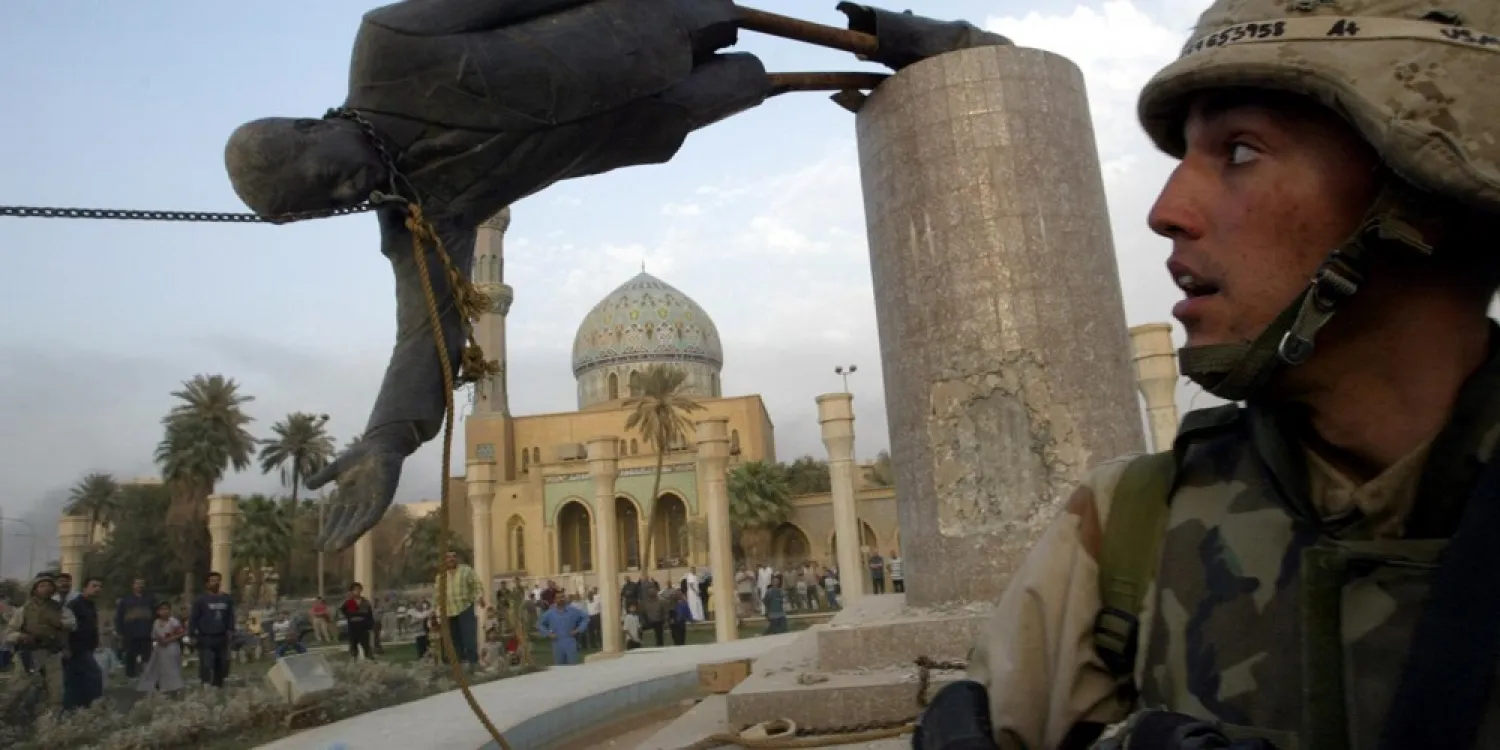Tuesday marked the 16th anniversary of the US invasion of Iraq that ended the 35-year rule of the Baath party and overthrew its one leader Saddam Hussein.
American troops arrested Saddam in December later that year after it discovered his hideout in the Salaheddine province. He was turned over to the new Iraqi authorities that put him on trial for crimes against humanity. He was executed four years later in January 2007.
Despite the long years that have passed since the collapse of his regime and execution, Saddam’s shadow still looms large over the lives of Iraqis, whether in everyday life or in politics. The people remain divided over assessing the Baath era and Saddam’s dictatorship when compared to the new era of “democracy” that has emerged from their ashes.
Debate has raged on whether April 9, the day the former regime collapsed, should be considered a national holiday or a day to mark the beginning of occupation. In the early years after the overthrow, ruling authorities used to declare the day a national holiday. The current government of Prime Minister Adel Abdul Mahdi and his predecessors Haidar al-Abadi and Nuri al-Maliki did not.
The debate on whether Iraq was better off under Saddam’s regime or under the current rule rages on. Some sides that used to oppose him have shifted their stance and said in recent days that their lives were better under the former regime.
MP and former opponent Faiq al-Sheikh Ali openly praised Saddam and his predecessor Ahmed Hassan al-Bakr, saying that they had distributed residential land on the people for free throughout their years in power.
“The new thieves that the US has chosen from the streets have not done so,” he remarked.
Some two months ago, a poet from the South recited a popular poem in praise of Saddam’s era and which criticized the current regime. The incident prompted local authorities to arrest him on charges of promoting Saddam’s rule, which is considered a crime by the Accountability and Justice Act.
The growing support for the Saddam era among various political and popular circles has prompted several political powers to activate the act and adopt strict measures against advocates of the former Baath regime.
The majority of those voicing support for the Saddam years are only doing so as an indirect way to highlight the current regime’s corruption, mismanagement and sectarianism that it has been cementing for over a decade and a half in power. Their praise for Saddam does not necessarily mean that he was a model to be followed.
This was perhaps best exemplified by an article released by Sadrist leader Moqtada al-Sadr on the anniversary of the US invasion. Sadr, whose father Ayatollah Mohammed Sadeq was assassinated by the Saddam regime in 1999, said that 16 years after the fall of the Baath regime, the “people are still marginalized.”
“Despite 16 years since the collapse of the dictator, Iraq is still suffering from the horrors of war, poverty, corruption, oppression and degradation. Ignorance, oppression of liberties and abuse of religion have become rampant,” he added.
“Sixteen years and the Baath ideology still grips those in power. Sectarianism still eats away at the foundations of the state to, unfortunately, spread among the people.”
“Sixteen years and Iraq is still a stranger among its surroundings and neighbors as neither do its people want to be open to others and nor does their government seek to do so. Sixteen years and the Iraqi people bow their heads in shame over the corruption of their government. Sixteen years and the militias are still controlling the will of the government and the lives of the people,” Sadr lamented.
Abadi meanwhile, said that Iraq was in need of a “reassessment” of the political process and structure of the state in order to introduce reform. In a statement Tuesday, he said: “All political parties and powers must assume their national historic responsibilities towards the state and its fate.”
Debate in Iraq has even raged about the fate of Saddam’s numerous presidential palaces. The people have directed severe criticism against authorities for their neglect of these palaces, which were supposed to be transformed into recreational and tourist destinations that are a reminder of the former regime.
MP Ali al-Bdeiri said that all countries, except for Iraq, invest in landmarks that are reminders of previous regimes.









